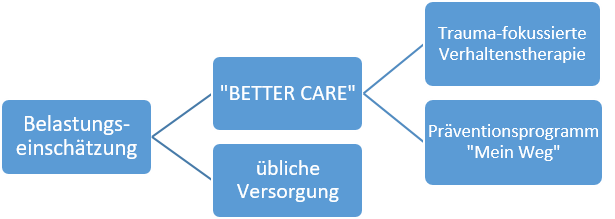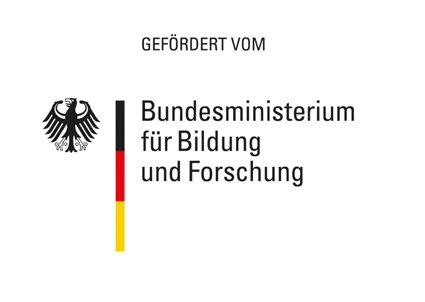BETTER CARE
Better care for Unaccompanied Young Refugees: Comparing a Stepped Care Model with Usual Care

...
Keywords
Trauma, psychotherapeutische Versorgung, Jugendhilfe, Flüchtlinge, gestuftes Versorgungsmodell
Project Management
Prof. Dr. Dipl.-Psych. Rita Rosner, Katholische Universität Eichstätt-Ingolstadt (Konsortialleitung)

Prof. Dr. Ute Ziegenhain, Universität Ulm, Klinik für Kinder- und Jugendpsychiatrie/Psychotherapie
Univ.-Prof. Dr. Paul Plener, MHBA, Medizinische Universität Wien, Universitätsklinik für Kinder- und Jugendpsychiatrie
Prof. Dr. Reinhold Kilian, Universität Ulm, Klinik für Psychiatrie und Psychotherapie II
Dr. Dipl.-Psych. Heinz Kindler, Deutsches Jugendinstitut

Project Term
6 years (starting in February 2019)
Link Project Website
Description of the Project
Since 2015, up to 70.000 unaccompanied young refugees (UYRs) live in child and adolescent welfare institutions in Germany. Considering that UYRs have a higher risk of developing psychological problems, it is crucial to improve their mental health and therefore enable these young people to successfully integrate into society. The aim of the „BETTER CARE“-project is to offer a stepped care approach for UYRs, which is adapted and altered to their individual needs. The child and adolescent welfare institutions involved in the project will be randomized and will either continue with the usual care, combined with a stress assessment of the UYRs, or implement the „BETTER CARE“-approach. This “BETTER CARE”-approach includes an evidence-based trauma-focused cognitive behavioral therapy if the stress symptoms of the UYRs are clinically relevant on the one hand, and a preventive group program called “Mein Weg“ (engl. “My Way”) if the symptoms are subclinical or mild, on the other hand. The cognitive behavioral therapy consists of 12 to 18 sessions with a therapist who has been specially trained by the project team. The prevention program will be implemented by the social workers in each child and adolescent welfare institution. The social workers are specifically trained and supervised by the project team.
Therefore this “BETTER CARE”-project provides child and adolescent welfare institutions with support and a goal-orientated training using scientifically proven methods.

Publications
Unterhitzenberger, J., & Rosner, R. (2016). Case report: manualized trauma-focused cognitive behavioral therapy with an unaccompanied refugee minor girl. European Journal of Psychotraumatology, 7(1).
Unterhitzenberger, J., Eberle-Sejari, R., Rassenhofer, M., Sukale, T., Rosner, R., & Goldbeck, L. (2015). Trauma-focused cognitive behavioral therapy with unaccompanied refugee minors: a case series. BMC psychiatry, 15(260).
Pfeiffer, E., & Goldbeck, L. (2017). Evaluation of a Trauma‐Focused Group Intervention for Unaccompanied Young Refugees: A Pilot Study. Journal of traumatic stress, 30(5), 531-536.
Pfeiffer, E., Sachser, C., Rohlmann, F., & Goldbeck, L. (2018). Effectiveness of a trauma‐focused group intervention for young refugees: a randomized controlled trial. Journal of Child Psychology and Psychiatry, 59(11), 1171-1179.
Rosner, R., Sachser, C., Hornfeck, F., Kilian, R., Kindler, H., Muche, R., et al. (2020). Improving mental health care for unaccompanied young refugees through a stepped-care approach versus usual care+: study protocol of a cluster randomized controlled hybrid effectiveness implementation trial. Trials 21:1013. doi.org/10.1186/s13063-020-04922-x
Garbade, M., Eglinsky, J., Kindler, H., Rosner, R., Sachser, C., & Pfeiffer, E. (2023). Factors affecting the acculturation strategies of unaccompanied refugee minors in Germany. Frontiers in Psychology, 14: 1149437. doi.org/10.3389/fpsyg.2023.1149437
Hornfeck, F., Eglinsky, J., Garbade, M., Rosner, R., Kindler, H., Pfeiffer, E., & Sachser, C. (2023). Mental health problems in unaccompanied young refugees and the impact of post-flight factors on PTSS, depression and anxiety–A secondary analysis of the Better Care study. Frontiers in Psychology, 14: 1149634. https://doi.org/10.3389/fpsyg.2023.1149634
Contact Address
Maike Garbade, Kinder- und Jugendpsychiatrie/Psychotherapie, Uniklinik Ulm, Steinhövelstr. 5, 89075 Ulm, Tel.: 0731 500 61680, better.care[at]uniklinik-ulm.de
Jenny Eglinsky, Kinder- und Jugendpsychiatrie/Psychotherapie, Uniklinik Ulm, Steinhövelstr. 5, 89075 Ulm, Tel.: 0731 500 61789 , better.care[at]uniklinik-ulm.de
Jacob Segler, Kinder- und Jugendpsychiatrie/Psychotherapie, Uniklinik Ulm, Steinhövelstr.5, 89075 Ulm, Tel.: 0731 500 61688, better.care[at]uniklinik-ulm.de
Funded by
Bundesministerium für Bildung und Forschung (BMBF)
